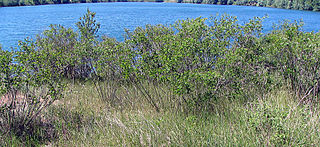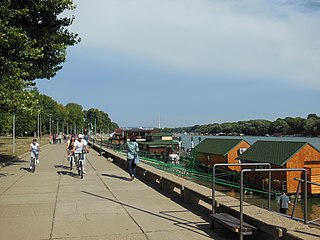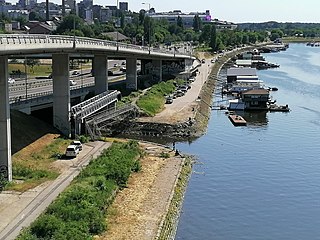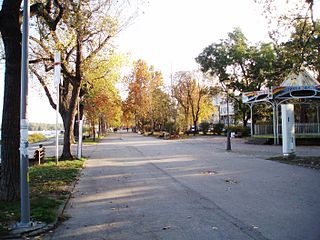This article deals with the system of transport in Belgrade, both public and private.

Ada Ciganlija, colloquially shortened to Ada, is a river island that has artificially been turned into a peninsula, located in the Sava River's course through central Belgrade, Serbia. The name can also refer to the adjoining artificial Lake Sava and its beach. To take advantage of its central location, over the past few decades, it was turned into an immensely popular recreational zone, most notable for its beaches and sports facilities, which, during summer seasons, can have over 100,000 visitors daily and up to 300,000 visitors over the weekend. Owing to this popularity, Ada Ciganlija has been commonly nicknamed "More Beograda", which was officially accepted as an advertising slogan in 2008, stylised as More BeogrADA.

Great War Island is a river island in Belgrade, capital of Serbia. It is located at the confluence of the Sava and Danube rivers. Though uninhabited, the island is part of the Belgrade City proper, and belongs to the city municipality of Zemun.
Lido is a non-residential urban neighborhood of Belgrade, the capital of Serbia. It is located in Belgrade's municipality of Zemun.
Ada Huja is an urban neighborhood of Belgrade, the capital of Serbia. It is located in Belgrade's municipality of Palilula.

Makiš is a forest and an urban neighborhood of Belgrade, the capital of Serbia. It is located in Belgrade's municipality of Čukarica.

Blokovi or Novobeogradski blokovi is the semi-formal plural name for a group of urban neighborhoods in Belgrade's municipality of New Belgrade.

Savski Nasip is an urban neighborhood of Belgrade, the capital of Serbia. It is located in Belgrade's municipality of Novi Beograd. In wider sense, the term is used for the entire left bank of the Sava on the territory of the New Belgrade, which is partially being arranged as the pedestrian "Sava quay". Since early 2010s, the term was colloquially attached to the westernmost section of the bank, the riparian zone which is threatened by the illegal construction of weekend houses in the forbidden zone.

Topčiderska River, or colloquially Topčiderka, or Topčiderski Creek, is a river in north-central Serbia, a 30 km-long right tributary to the Sava river to which it flows in the urban section of Belgrade. It is one of the 40 rivers, streams and creeks that flow or used to flow through Belgrade.

The Gazela Bridge is the most important bridge over the Sava river in Belgrade, the capital of Serbia. It is a part of the city highway and it lies on European route E75, on the highway passing through the wider city center, connecting Belgrade with Niš to the south, and Novi Sad to the north. The bridge was designed by a group of engineers led by Milan Đurić, and built by the Mostogradnja company.

Branko's Bridge is the second-largest bridge of Belgrade, Serbia, connecting the city center with New Belgrade across the Sava river. Built in 1956 on the foundations of the 1934 King Alexander Bridge, which was destroyed in World War II, it reconnected Belgrade and Zemun as the only motorway bridge at the time. After several official and unofficial names, the present name stuck after the Brankova Street, which extends into the bridge from the direction of the old section of Belgrade.

Pančevo Bridge or colloquially Pančevac is a bridge over the Danube in Belgrade, the capital of Serbia. It was named after the northern city of Pančevo which is connected to Belgrade by the road continuing from the bridge. It was the first permanent bridge across the Danube in Belgrade, and until December 2014, when the Pupin Bridge opened further upstream in the municipality of Zemun, the only one.

Zemunski Kej is an urban neighborhood of Belgrade, the capital of Serbia. It is located in Belgrade's municipality of Zemun.

The Ada Bridge is a cable-stayed bridge over the Sava river in Belgrade, Serbia. The bridge crosses the tip of Ada Ciganlija island, connecting the municipalities of Čukarica and New Belgrade. The bridge pylon is located on the tip of the island, which has been reinforced with large amounts of concrete and has been slightly enlarged to provide stronger foundations. Construction began in 2008, and the bridge opened on 1 January 2012. Adjoining roads were completed in 2013.

The Belgrade tram system is a 1000 mm gauge network that in 2021 had 12 routes running on 43.5 kilometres (27.0 mi) of track in the city of Belgrade, Serbia. It is operated with 231 trams, including ČKD Tatra KT4, CAF Urbos, and Duewag Be 4/6 trams. The first tram line was introduced on 14 October 1892. In the late 2000s, complete reconstruction of the system commenced.

The Old Sava Bridge is a 430-metre-long (1,410 ft) and 40-metre-wide (130 ft) bridge, crossing the river Sava in Belgrade, Serbia. It is the smallest road bridge in the Serbian capital and is used both for car and tram traffic. The main span between the two pillars of this tied arch bridge is over 157 m (515 ft) in length. Two bus lines and three tram lines of Belgrade public transport use the bridge.

The Pupin Bridge is a road bridge over the Danube River in Belgrade, Serbia. The bridge is located upstream of the city center and connects Belgrade neighbourhoods of Zemun and Borča. It is part of Semi-Inner Ring circle. Opened in December 2014, it became the second bridge over the Danube in Belgrade, after the Pančevo Bridge in 1946.
The Obrenovac-Surčin Bridge on A2 motorway is the bridge crossing the rivers Kolubara and Sava in the suburban section of Belgrade, the capital of Serbia. It is part of the A2 motorway, in Serbia more often called Corridor XI. Preparatory works on the bridge began on 12 February 2017 and it was ceremonially opened, with the adjoining Obrenovac-Surčin section of the motorway, on 17 December 2019.

Old Railroad Bridge is a bridge over the Sava river in Belgrade, the capital of Serbia. It was the first railway bridge in Belgrade and today is one of two across the Sava, and three in general. It is not operational since the summer of 2018.

King Alexander Bridge, in full The Bridge of King Alexander Karađorđević or The Bridge of the Knightly King Alexander, was a road and tram bridge over the Sava river, in Belgrade, capital of Yugoslavia. It was the first permanent road bridge across the Sava in Belgrade after almost 250 years and the Long Bridge from 1688. Finished in 1934, it was damaged and out of use since 1941, and fully demolished in 1944, during World War II. Its pylons were later used for the modern Branko's Bridge, built in 1956. The bridge was revered while existed being described as "gorgeous" and "one of the most important object ever built in Belgrade".
































